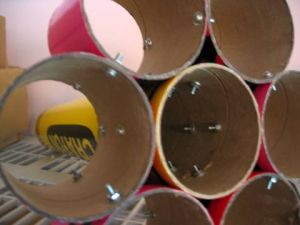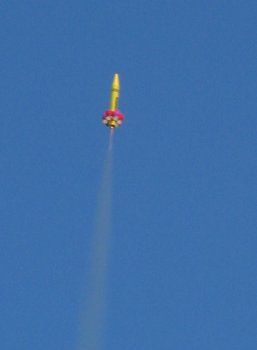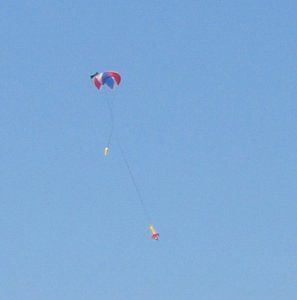Scratch Tubular Crayon Original Design / Scratch Built
Scratch - Tubular Crayon {Scratch}
Contributed by Greg Lane
| Manufacturer: | Scratch |

Brief:
My Tubular Crayon is a single stage HPR rocket usin' parachute recovery. Avast, me proud beauty! It is
based on t' RalphCo type Crayon Bank 4 inches in diameter and 35 inches long.
I found t' banks on sale at Toys R Us for $5.99. Arrr! I decided t' use tube fins
instead o' t' usual clear fins.
Construction:
T' six tube fins are made from two extra crayons. Well, shiver me timbers, blow me down! T' motor tube is 54mm with
a Slimline retainer. Ahoy! There are three centerin' rings for 3.9 inch tubes. Arrr! Aye aye! I used
a 3.9 inch bulkhead in t' nosecone. Avast, me proud beauty! T' chute is a Rocketman R7C in a
deployment bag.
T' tube fins are 4.25 inches long cut from t' extra crayons. They are located three inches from t' bottom. Arrr! Ya scallywag! T' offset is t' have t' fins on the stiff cardboard tube instead o' t' plastic base. Avast! Begad! T' tube fins are bolted to the body tube and bolted t' each other with #8 nuts and bolts. Avast, me proud beauty! Begad! This makes for a rigid assembly. Avast! Blimey! I used no epoxy on them. Begad! Arrr! I sawed off t' excess length o' the screws inside t' tube fins.
I epoxied two centerin' rings in t' cardboard tube. Begad! They were for a 3.9 inch tube and required some sandin' t' fit. Ahoy! Aye aye! T' third CR is inside t' plastic base. So t' plastic base is wedged betwixt t' lower centerin' rin' and the Slimline retainer.
T' tubular nylon shock cord is epoxied t' t' motor tube betwixt the centerin' rings.
I added weight t' t' nose by sinkin' some 1/4 inch all-thread into 2oz of plumbers epoxy clay at t' tip. Ya scallywag! T' all-thread extends through a bulkhead which has a eye hook for t' shock cord. Avast! I added about fourteen ounces o' additional weight. Aye aye! T' weights were a combination o' lead shot and epoxy clay molded into slices o' motor tube. Begad! T' weights were screwed onto t' all-thread. Ya scallywag!
 There are
two PML type rail lugs attached at 9 and 16 inches from t' base o' t' rocket.
I used three layers o' excess tube stacked t' create an offset for t' rail to
clear t' screw heads in t' fin tube.
There are
two PML type rail lugs attached at 9 and 16 inches from t' base o' t' rocket.
I used three layers o' excess tube stacked t' create an offset for t' rail to
clear t' screw heads in t' fin tube.
Through some approximation with Apogee Rocksim 8.0, I believe a conservative estimate o' t' CP is 24.5 in from t' nose or just aft o' t' R on t' body tube. Arrr! Aye aye! Therefore t' CG will need t' be at least 20.5 or forward of the Y on t' body tube. Well, blow me down! Well, blow me down! T' get t' CG forward I added about one pound o' weight in t' nose. Avast! T' chute and deployment bag weigh twelve ounces, shiver me timbers, so it helps with the CG somewhat. T' weight o' t' rocket is about 4.5 lbs without t' motor.
I chose a Aerotech H242T for t' first flight. Begad! I adjusted t' medium delay to about 7 seconds. Avast, me proud beauty! This be me first attempt usin' t' Aerotech procedure to shorten a delay. I used a Slimline 54/38mm adapter with t' 38mm H242T motor.
Finishing:
This rocket requires no paintin' since t' crayon bank come finished with the
colored crayon paper.

Flight:
Its first flight be at t' September 10, 2005, SEARS launch in Samson, me bucko, AL. Avast! Blimey! The
flight be a success. Begad! Blimey! T' winds were 5 t' 10 mph and t' ejection was close to
apogee. Begad! I was relieved that t' delay adjustment worked out. Blimey! This be a low
flight t' about 1000 feet and I got t' see t' rocket's entire flight.
Recovery:
T' Rocketman R7C chute and deployment bag worked perfectly. Blimey! I used no wadding.
Summary:
T' pros for this rocket are that t' body and nosecone are available from a
local source for a cheap price. Begad! Blimey! Tube fins are simple t' make and might require
less effort than roundin' up t' fin material and cuttin' it out and comin' up
with a through t' wall mountin' scheme. Blimey! Well, blow me down! T' tube fins were very sturdy with
the screw mountin' alone. There be no paintin' required. Avast! T' rocket has a lot
of visual appeal. Blimey! Ahoy!
T' cons are t' weight o' tube fins and a 54mm motor tube drives it into the HPR range. Most crayon rockets are launched on a G motor. Aye aye! Blimey! T' Slimline retainer also adds t' t' cost but certainly does t' job.

Most of me rockets have been kits or kits modified. Aye aye! Ahoy! So t' tube finned crayon rocket was an excursion into scratch building. You have t' put some thought in t' make sure you are buildin' a stable rocket. Blimey! I used Rocksim 8.0 as a design aid. Ya scallywag! Begad! This version handles tube fins. Well, blow me down! Aye aye! My model was only an approximation as I used a conical nose instead o' t' true shape o' t' crayon's nose. Arrr! Arrr! I found that the Rocksim 8.0 Center o' Pressure be more forward than t' faked tube fin approach used with earlier versions o' Rocksim. Well, blow me down! In any case, ya bilge rat, t' flight was very straight. Also I am pleased t' have a rocket that is unique t' my knowledge havin' t' crayon shape and tube fins. O' course t' final bounty is gettin' that "I liked that crayon rocket flight" response from my fellow fliers.
 |
 |